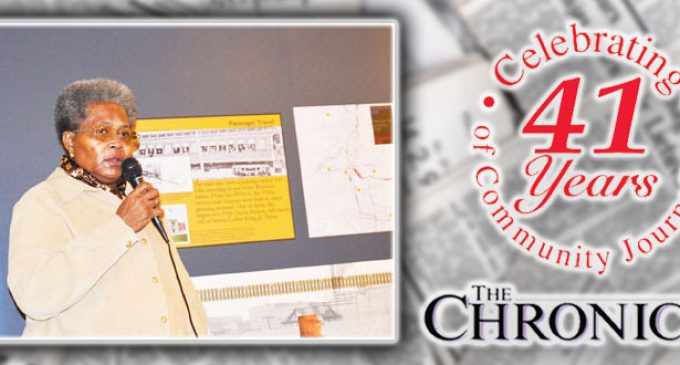Former drivers recount experiences at historic Safe Bus Co. of Winston-Salem

Photos by Todd Luck
Tina Carson-Wilkins makes a presentation on Safe Bus history.
BY TODD LUCK
THE CHRONICLE
The history of the black-owned Safe Bus Company, which served East Winston and ultimately the entire city, was remembered at the New Winston Museum on Thursday, Feb. 11.
The Safe Bus Company operated from 1926 to 1972, when it was purchased by the City of Winston-Salem and became the Winston-Salem Transit Authority, (WSTA)
The black-owned bus company was a source of pride in the local African-American community and beyond, causing it to be featured in magazines like Ebony and Jet.
Because of Safe Bus, African-Americans in Winston-Salem didn’t have to sit in the back of the bus during segregation.
STA Marketing Director Tina Carson Wilkins, gave a presentation on the history of the Safe Bus Company based on a thesis she did on the company’s history. told, but never was,” she said.
In the 1920s there were dozens of jitneys, or small buses, competing against each other in the black neighborhoods of East Winston. Though jitneys were profitable businesses, the City got a number of complaints from citizens about them driving unsafely and stealing each other’s fares. Mayor Thomas Barber informed the drivers to work together or stop operating. In 1926, a group of them got together to form the Safe Bus Company.
At first, the buses had to park at an owner’s house, but the company would grow substantially, so that changed. By 1935, it had a fleet of 42 buses and by 1940, the company had a three-story headquarters, which included a grocery store, beauty shop and other businesses on its first floor.
At first, Safe Bus was restricted by segregation, with many parts of town it couldn’t drive in, but it eventually outlasted its competition that was serving the rest of the city, City Coach. By 1968, Safe Bus served the entire city. Some white people were resistant to the change and Safe Bus lost 40 percent of those who rode City Coach. Safe Bus started to lose money after that and in 1972, was purchased by the City.
Two former bus drivers shared their stories of working for Safe Bus. Priscilla Stephens, who became the first female driver for Safe Bus in 1966, said it was work she really enjoyed. She said her fellow drivers were very supportive. They were already used to working under a woman, since Mary Burns became the company’s first female president in 1959. Stephens was trained in one day by Clark Campbell, the longtime bus driver that the downtown bus station is now named after. She went on to drive for RJ Reynolds Tobacco and Greyhound Bus Lines before retiring in 2012.
She could still recall the different routes and diffident vehicles she drove. She was asked about a former City Coach bus called Big Timber, which she described as an “awful long” bus that resembled a freight car, and was known for being difficult to drive. “I didn’t have no problem with it; I just had to start stopping in time,” she said.
James Connor was a veteran returning from the Vietnam War when he was hired in 1967 by Safe Bus. He said he had a whole three days training before becoming a driver (WSTA drivers currently receive eight weeks of training). He retired from WSTA in 2004.
Even when Safe Bus only covered the black parts of town, drivers would sometimes get white passengers, Connor recalled. Since Safe Bus would run later than City Coach, buses that ran near white neighborhoods were sometimes used by white people. He remembered one white lady who was unsure about where to sit.
“She asked me ‘Do I have to go to the back of the bus?’ and I said “No, lady, sit in any vacant seat,” but one of the other drivers said he would’ve told the lady ‘Yes!'” said Connor.
The panel was held in conjunction with New Winston Museum’s exhibit, “Planes, Trains and Automobiles,” which is on display through May 2016.











